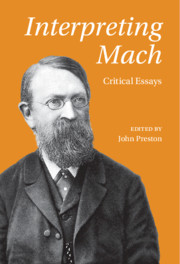Book contents
- Interpreting Mach
- Interpreting Mach
- Copyright page
- Dedication
- Contents
- Figures
- Tables
- Contributors
- Introduction
- 1 Ernst Mach’s Piano and the Making of a Psychophysical Imaginarium
- 2 Mother’s Milk and More
- 3 Meaningful Work
- 4 Mach on Analogy in Science
- 5 Ernst Mach’s Enlightenment Pragmatism
- 6 On the Philosophical and Scientific Relationship between Ernst Mach and William James
- 7 Ernst Mach and Friedrich Nietzsche
- 8 Abstraction, Pragmatism, and History in Mach’s Economy of Science
- 9 Holding the Hand of History
- 10 Ernst Mach and the Vienna Circle
- 11 Narratives Divided
- 12 Phenomenalism, or Neutral Monism, in Mach’s Analysis of Sensations?
- 13 The Case for Mach’s Neutral Monism
- Index
- References
11 - Narratives Divided
The Austrian and the German Mach
Published online by Cambridge University Press: 05 March 2021
- Interpreting Mach
- Interpreting Mach
- Copyright page
- Dedication
- Contents
- Figures
- Tables
- Contributors
- Introduction
- 1 Ernst Mach’s Piano and the Making of a Psychophysical Imaginarium
- 2 Mother’s Milk and More
- 3 Meaningful Work
- 4 Mach on Analogy in Science
- 5 Ernst Mach’s Enlightenment Pragmatism
- 6 On the Philosophical and Scientific Relationship between Ernst Mach and William James
- 7 Ernst Mach and Friedrich Nietzsche
- 8 Abstraction, Pragmatism, and History in Mach’s Economy of Science
- 9 Holding the Hand of History
- 10 Ernst Mach and the Vienna Circle
- 11 Narratives Divided
- 12 Phenomenalism, or Neutral Monism, in Mach’s Analysis of Sensations?
- 13 The Case for Mach’s Neutral Monism
- Index
- References
Summary
This chapter analyses the careers of two distinct narratives about Mach’s philosophical legacy that prevailed among German-speaking physicists and philosophers for more than a generation. Planck’s polemic against Mach sired the idea of a Machian philosophical system that was irreconcilable with modern physics, Boltzmann’s legacy foremost. But Planck also bereaved Mach’s positivism of its naturalist foundation and identified it straight with phenomenalism. In contrast, many Austrians considered the epistemologies of Mach and Boltzmann as even mutually supportive for a defence of empiricist indeterminism. Taking positivism in its original, more general understanding, they underscored Mach’s broader anti-metaphysical and empiricist stance, eventually adopting him as a standard-bearer for the new movement of Logical Empiricism. While these understandings were not necessarily tied to a positive or negative assessment, they often amounted to simplifications, transformations, or even contortions of Mach’s thinking, which made it increasingly difficult to declare oneself in Mach’s footsteps and simultaneously to advocate scientific modernism.
- Type
- Chapter
- Information
- Interpreting MachCritical Essays, pp. 208 - 234Publisher: Cambridge University PressPrint publication year: 2021
References
- 1
- Cited by

